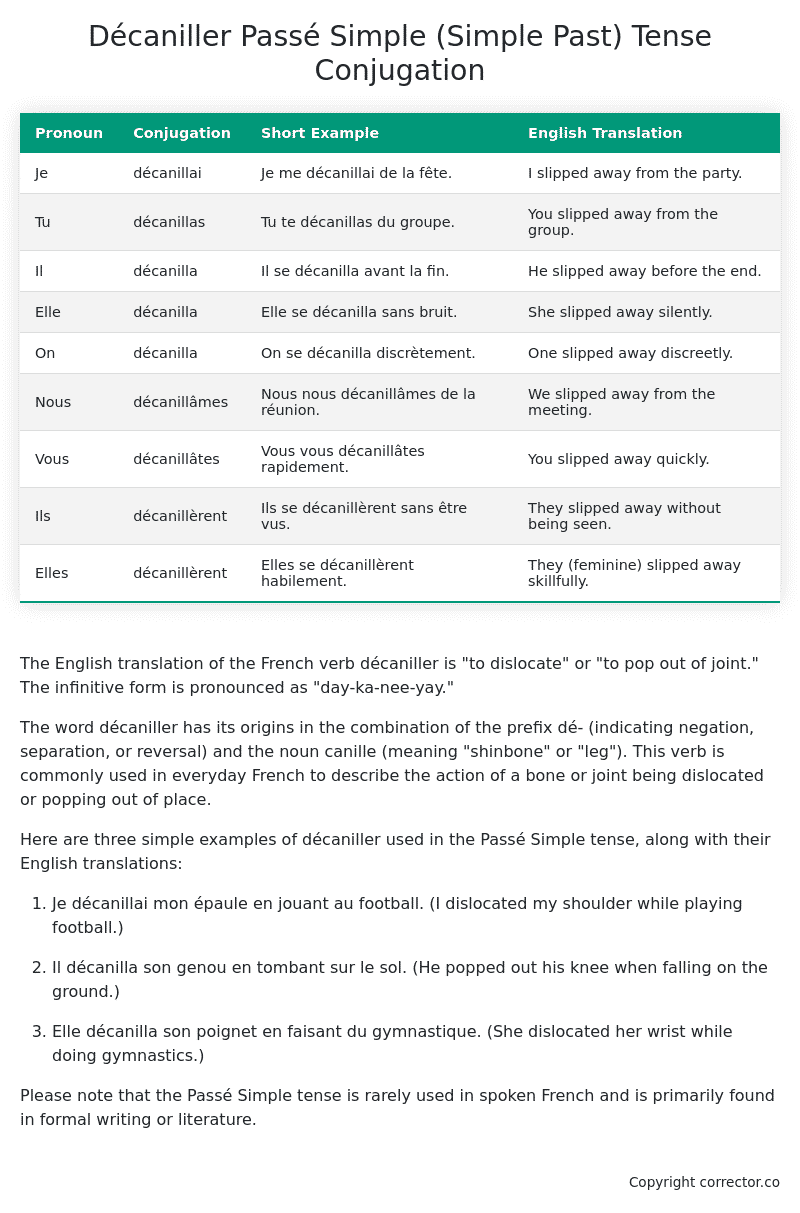Passé Simple (Simple Past) Tense Conjugation of the French Verb décaniller
Introduction to the verb décaniller
The English translation of the French verb décaniller is “to dislocate” or “to pop out of joint.” The infinitive form is pronounced as “day-ka-nee-yay.”
The word décaniller has its origins in the combination of the prefix dé- (indicating negation, separation, or reversal) and the noun canille (meaning “shinbone” or “leg”). This verb is commonly used in everyday French to describe the action of a bone or joint being dislocated or popping out of place.
Here are three simple examples of décaniller used in the Passé Simple tense, along with their English translations:
-
Je décanillai mon épaule en jouant au football.
(I dislocated my shoulder while playing football.) -
Il décanilla son genou en tombant sur le sol.
(He popped out his knee when falling on the ground.) -
Elle décanilla son poignet en faisant du gymnastique.
(She dislocated her wrist while doing gymnastics.)
Please note that the Passé Simple tense is rarely used in spoken French and is primarily found in formal writing or literature.
Table of the Passé Simple (Simple Past) Tense Conjugation of décaniller
| Pronoun | Conjugation | Short Example | English Translation |
|---|---|---|---|
| Je | décanillai | Je me décanillai de la fête. | I slipped away from the party. |
| Tu | décanillas | Tu te décanillas du groupe. | You slipped away from the group. |
| Il | décanilla | Il se décanilla avant la fin. | He slipped away before the end. |
| Elle | décanilla | Elle se décanilla sans bruit. | She slipped away silently. |
| On | décanilla | On se décanilla discrètement. | One slipped away discreetly. |
| Nous | décanillâmes | Nous nous décanillâmes de la réunion. | We slipped away from the meeting. |
| Vous | décanillâtes | Vous vous décanillâtes rapidement. | You slipped away quickly. |
| Ils | décanillèrent | Ils se décanillèrent sans être vus. | They slipped away without being seen. |
| Elles | décanillèrent | Elles se décanillèrent habilement. | They (feminine) slipped away skillfully. |
Other Conjugations for Décaniller.
Le Present (Present Tense) Conjugation of the French Verb décaniller
Imparfait (Imperfect) Tense Conjugation of the French Verb décaniller
Passé Simple (Simple Past) Tense Conjugation of the French Verb décaniller (You’re reading it right now!)
Passé Composé (Present Perfect) Tense Conjugation of the French Verb décaniller
Futur Simple (Simple Future) Tense Conjugation of the French Verb décaniller
Futur Proche (Near Future) Tense Conjugation of the French Verb décaniller
Plus-que-parfait (Pluperfect) Tense Conjugation of the French Verb décaniller
Passé Antérieur (Past Anterior) Tense Conjugation of the French Verb décaniller
Futur Antérieur (Future Anterior) Tense Conjugation of the French Verb décaniller
Subjonctif Présent (Subjunctive Present) Tense Conjugation of the French Verb décaniller
Subjonctif Passé (Subjunctive Past) Tense Conjugation of the French Verb décaniller
Subjonctif Imparfait (Subjunctive Imperfect) Tense Conjugation of the French Verb décaniller
Subjonctif Plus-que-parfait (Subjunctive Pluperfect) Tense Conjugation of the French Verb décaniller
Conditionnel Présent (Conditional Present) Tense Conjugation of the French Verb décaniller
Conditionnel Passé (Conditional Past) Tense Conjugation of the French Verb décaniller
Conditionnel Passé II (Conditional Past II) Tense Conjugation of the French Verb décaniller
L’impératif Présent (Imperative Present) Tense Conjugation of the French Verb décaniller
L’impératif Passé (Imperative Past) Tense Conjugation of the French Verb décaniller
L’infinitif Présent (Infinitive Present) Tense Conjugation of the French Verb décaniller
L’infinitif Passé (Infinitive Past) Tense Conjugation of the French Verb décaniller
Le Participe Présent (Present Participle) Tense Conjugation of the French Verb décaniller
Le Participe Passé (Past Participle) Tense Conjugation of the French Verb décaniller
Struggling with French verbs or the language in general? Why not use our free French Grammar Checker – no registration required!
Get a FREE Download Study Sheet of this Conjugation 🔥
Simply right click the image below, click “save image” and get your free reference for the décaniller Passé Simple tense conjugation!

Décaniller – About the French Passé Simple (Simple Past) Tense
Formation
Usage
Narration
Historical Context
Interactions with other tenses
Passé Composé
Imparfait
Conditional and Subjunctive
Summary
I hope you enjoyed this article on the verb décaniller. Still in a learning mood? Check out another TOTALLY random French verb conjugation!


